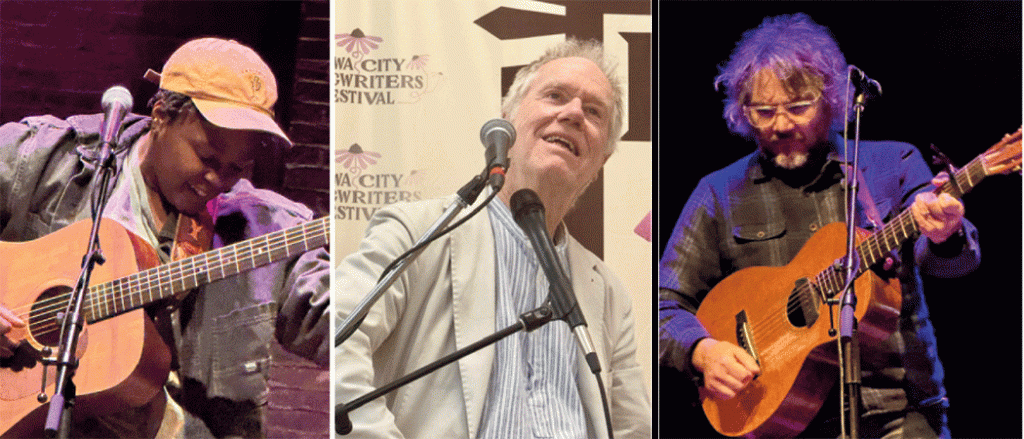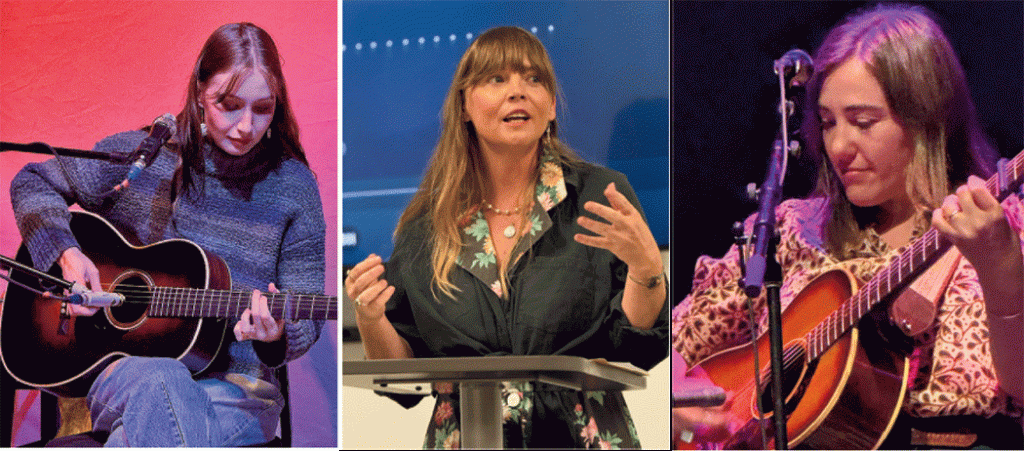
The first-ever Iowa City Songwriters Festival (September 4-6) was something worth singing about. The event brought together nationally known artists such as Jeff Tweedy and Joy Oladokun with local musicians like Dave Moore and Deb Talan and up-and-coming songwriters including Ken Pomeroy and Margo Cilker to celebrate the craft of songwriting through thoughtful talks and panels as well as live performances designed to entertain and educate.
Long known for its literary legacy, Iowa City holds the distinction of being the first American city named by UNESCO as a City of Literature. It’s the home of the University of Iowa as well as the residence of the celebrated Iowa Writers’ Workshop.
At the festival’s opening, Brian Johannesen, Programming Director for the Englert Theatre and host of the event, joked that Iowa City even has its literary heritage etched into the sidewalk—a nod to the Iowa Avenue Literary Walk, which features bronze plaques honoring more than 80 authors. Johannesen said the goal of ICSF was to elevate songwriting to the same cultural status as the other writing arts for which the city is known.
While the ICSF included special programming for invited participants—referred to as “scholars,” who are just beginning their musical journeys—the festival also offered plenty of memorable moments for the general public. One standout event came even before the official kickoff: a free, open-to-all songwriting workshop led by the festival’s first artist-in-residence, Courtney Marie Andrews, on Wednesday night.

The Grammy-nominated singer-songwriter, musician, and poet set a tone that was both thoughtful and playful. “Songs are little philosophies, songs are friends, songs are conversations, songs are diuretics,” she told the crowd. “And so much of writing songs is simply paying attention to your own life.” Drawing on classics like Boudleaux Bryant’s “Love Hurts” and Leonard Cohen’s “So Long, Marianne,” Andrews demonstrated how both sweeping emotions and intimate details can shape powerful songwriting.
The public side of the festival offered a lively mix of musical performances and insightful conversations. Featured artists took to the stage not only to showcase their talents but also to speak about their creative processes to give audiences a deeper sense of both the music and the craft behind it. The live shows were purposely stripped-down acoustic affairs, usually just the artist with a guitar, so one could hear and appreciate the lyrics and song structures.
The festival offered a rich blend of musical highlights and educational moments. Jeff Tweedy gave a rousing Friday night performance at the Englert that was simultaneously sincere and jovial. He played several compelling numbers from his forthcoming triple album with his band Wilco, Twilight Override, old favorites such as “I Am Trying Not to Break Your Heart” and “Impossible Germany,” and freely offered advice to the songwriters in the audience between the tunes.
Earlier in the evening, Tweedy gave an inspiring Artist Talk and offered a statement of his personal principles: “I obstinately refuse to think of music as a business,” he declared. He swore his dedication to the art and said if he was working on a song and having difficulty, he owed it to the song to complete it. The problem itself was a gift that could lead to deeper insights.
He also noted that songs have a life of their own in the mind of the listener and offered the following example. “I thought Woody Guthrie was being poetic when he wrote ‘I want to sleep on a bed of California stars.’ Years later, I found out California stars was a quilting pattern.”
Other artists noted that songs are not necessarily finished even after they have been successfully recorded. At an Artist Panel discussion with noted musicians who are relatively early in their careers, Buffalo Nichols, Sunny War, and Margo Cilker spoke about songs as living things that continue to evolve. “Songs are never really done,” Nichols said. “They change as we change.” The other songwriters agreed and said that they often noticed new things about their older material while performing them.
At 79-years of age, Loudon Wainwright III was the oldest songwriter on the bill. He has recorded over 26 studio albums over the past five decades as well as the 2025 release Loudon Live in London. In his Artist Talk, he noted that anything can be a song, from a conversation with a friend to an observation of a natural event. He offered “Dead Skunk,” his top-20 hit from 1972, as an example, with its chorus:
“Dead skunk in the middle of the road
dead skunk in the middle of the road
stinking to high heaven.”
Because the song came out during a tumultuous time in American history, some listeners interpreted the lyrics as referring to President Nixon. That was not Wainwright’s intention, and he slyly noted that the song could be interpreted for today’s political landscape.
Wainwright brought humor and heart to the fest, joking about his age before performing a new song imagining another 80 years of life. Sharing the bill was Oklahoma native Ken Pomeroy, who, at just 22, was the youngest of the invited guest songwriters. She performed a song she wrote at age 14, offering a glimpse into her early artistic voice. The pairing of Wainwright and Pomeroy underscored a timeless truth: great songwriting transcends age.
The most inspiring moments of the festival came during Joy Oladokun’s Artist Talk. With warmth and wit, she posed a powerful question to the audience: “How do you be the best person as an artist in a world where catastrophe may be just around the corner?” Her reflections on songwriting as a purposeful, personal struggle resonated deeply. “Life is as silly as it is serious if you are paying attention,” she noted, striking a balance between humor and insight that left a lasting impression. Oladokun’s words carried even more weight later when backed by her dazzling nighttime performance.
The ICSF delivered a wealth of memorable moments, blending insightful conversations with compelling musical performances. While the full list of highlights is too long to name, a few stood out for their impact and artistry: Courtney Marie Andrews’s intimate evening showcase; the dynamic conference discussion featuring Ken Pomeroy, She Returns from War, and Willie Tea Taylor; and a captivating performance by Margo Cilker. All exemplified the festival’s spirit of creativity and connection.
The inaugural festival affirmed what Brian Johannesen and the Englert Theatre team set out to prove: songwriting is a literary art form worthy of the same recognition and respect as poetry, fiction, and drama in the City of Literature.
